12. April 2018 - 15:55
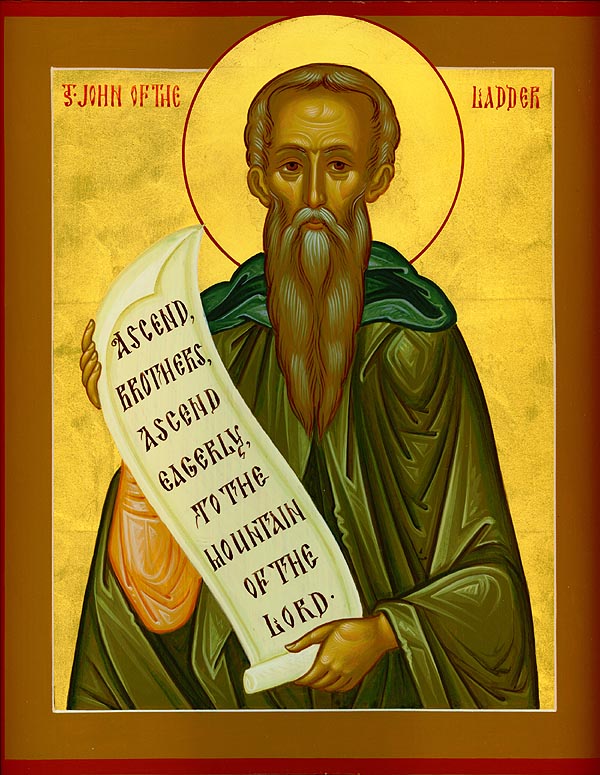 Saint John of the Ladder is honored by Holy Church as a great ascetic and author of the renowned spiritual book called THE LADDER, from which he is also called “of the Ladder” (Climacus).
Saint John of the Ladder is honored by Holy Church as a great ascetic and author of the renowned spiritual book called THE LADDER, from which he is also called “of the Ladder” (Climacus).
There is almost no information about Saint John’s origins. One tradition suggests that he was born in Constantinople around the year 570, and was the son of Saints Xenophon and Maria (January 26).
John went to Sinai when he was sixteen, submitting to Abba Martyrius as his instructor and guide. After four years, Saint John was tonsured as a monk. Abba Strategios, who was present at Saint John’s tonsure, predicted that he would become a great luminary in the Church of Christ.
8. April 2018 - 21:09
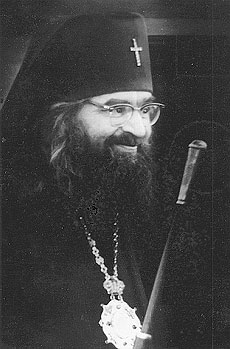 Pascha, 1940, Shanghai. A large Russian diaspora, forced to leave behind their homeland; many had lost their dear ones, and everything they owned, and now lived in want, in a foreign land. But God gave them a saintly bishop to comfort them, and keep them in remembrance of the grace and strength of Holy Orthodoxy.
Pascha, 1940, Shanghai. A large Russian diaspora, forced to leave behind their homeland; many had lost their dear ones, and everything they owned, and now lived in want, in a foreign land. But God gave them a saintly bishop to comfort them, and keep them in remembrance of the grace and strength of Holy Orthodoxy.
A member of St. John’s Shanghai flock, Nicholas Feodorovich Tsepitov, of Revda, Russia, preserved this Pascal Epistle all his life, even after his return to the Soviet Union in 1947. It gave him comfort there also, where more trials awaited him. He gave this epistle for publication to the Fund for the Canonization of St. John Maximovitch in Russia, and we present it here, in English translation, as a comfort to all.
Christ is Risen!
Let us arise in the deep dawn,
And instead of myrrh offer a hymn to the Lord.
St. John Maximovitch
We forestall the rising of the sun, and hasten in the depth of night to meet the Sun of Righteousness.
8. April 2018 - 13:03
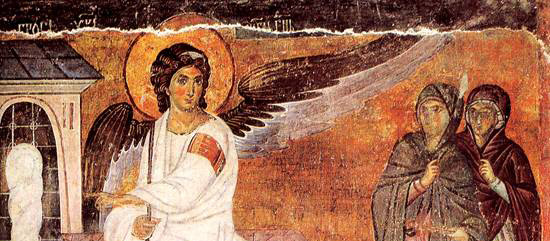 On Saturday, the day after the crucifixion of the Lord, His disciples and followers were filled with gloom, for they had seen their Lord and Master die, crucified on a cross. As Holy Scripture tells us, there was a man named Joseph from the Jewish town of Arimathea. He was a member of the council, a good and righteous man, who had not consented to their purpose and deed, and he was looking for the kingdom of God. This man went to Pilate and asked for the body of Jesus (Luke 23:50-52). Pilate gave him leave. So he came and took away His body. [He and] Nicodemus also, who had at first come to Him by night...took the body of Jesus, and bound it in linen clothes...as is the burial custom of the Jews. Now in the place where He was crucified there was a garden, and in the garden a new tomb where no one had ever been laid. So because of the Jewish day of Preparation, as the tomb was close at hand, they laid Jesus there (John 19:38-42). The women who had come with Him from Galilee followed, and saw the tomb, and how His body was laid; then they returned and prepared spices and ointments. On the Sabbath they rested according to the commandment (Luke 23:55-56).
On Saturday, the day after the crucifixion of the Lord, His disciples and followers were filled with gloom, for they had seen their Lord and Master die, crucified on a cross. As Holy Scripture tells us, there was a man named Joseph from the Jewish town of Arimathea. He was a member of the council, a good and righteous man, who had not consented to their purpose and deed, and he was looking for the kingdom of God. This man went to Pilate and asked for the body of Jesus (Luke 23:50-52). Pilate gave him leave. So he came and took away His body. [He and] Nicodemus also, who had at first come to Him by night...took the body of Jesus, and bound it in linen clothes...as is the burial custom of the Jews. Now in the place where He was crucified there was a garden, and in the garden a new tomb where no one had ever been laid. So because of the Jewish day of Preparation, as the tomb was close at hand, they laid Jesus there (John 19:38-42). The women who had come with Him from Galilee followed, and saw the tomb, and how His body was laid; then they returned and prepared spices and ointments. On the Sabbath they rested according to the commandment (Luke 23:55-56).
6. April 2018 - 16:45
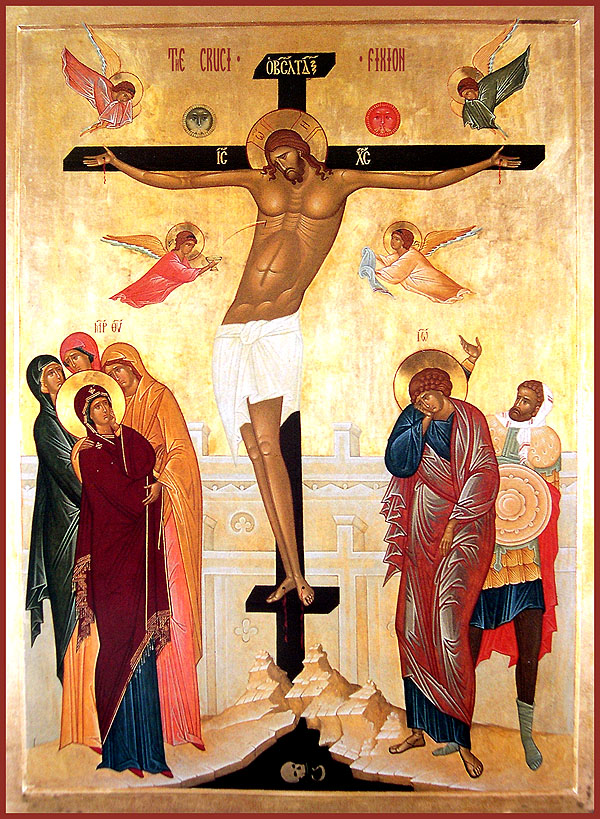 Great and Holy Friday
Great and Holy Friday
On Great and Holy Friday, Christ died on the Cross. He gave up His spirit with the words: “It is finished” (John 19:30). These words are better understood when rendered: “It is consummated.” He had accomplished the work for which His heavenly Father had sent Him into the world. He became a man in the fullest sense of the word. He accepted the baptism of repentance from John in the Jordan River. He assumed the whole human condition, experiencing all its alienation, agony, and suffering, concluding with the lowly death on the Cross. He perfectly fulfilled the prophecy of Isaiah:
“Therefore I will divide him a portion with the great, and he shall divide the spoil with the strong; because he has poured out his soul to death, and was numbered with the transgressors; yet he bore the sins of many, and made intercession for the transgressors.”
2. April 2018 - 11:25
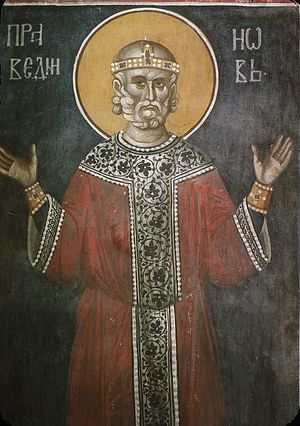 The Old Testament is revealed in the New Testament. The Book of Job reveals its meaning in an amazing way. It is read during the church services during Great Lent. This book prepares us to meet with the Suffering and Risen Christ.
The Old Testament is revealed in the New Testament. The Book of Job reveals its meaning in an amazing way. It is read during the church services during Great Lent. This book prepares us to meet with the Suffering and Risen Christ.
What does the Old Testament tell us about? It tells us about the interrelationship between God and man, just as do all the other Old Testament books. The Lord rules the world, rewards the righteous, and punishes sinners. However, as we can see from the Book of Job, not every affliction is punishment for sin.
In the holy book we read about how Job experiences onerous torments on the brink of death, and his friends urge him to repent in order to make God’s punishment cease. Job’s friends do not see that he is accepting torments not for his secret sins, or that the instigator of all his suffering is satan, who envies God and hates God’s servants. Job wars with satan. Christ accepts sufferings as does Job—not for himself, not for his iniquities. Christ is crucified for the sins of others.
31. March 2018 - 21:20
 PALM SUNDAY: THE ENTRANCE OF OUR LORD JESUS CHRIST INTO JERUSALEM
PALM SUNDAY: THE ENTRANCE OF OUR LORD JESUS CHRIST INTO JERUSALEM
FIRST ANTIPHON
VERSE: I love the Lord because He has heard the voice of my supplication.REFRAIN: Through the prayers of the Theotokos, O Savior, save us.
VERSE: Because He inclined His ear to me, therefore I will call on Him as long as I live.
REFRAIN: Through the prayers of the Theotokos, O Savior, save us.
VERSE: Glory to the Father and to the Son and to the Holy Spirit, now and ever and unto ages of ages. Amen.
REFRAIN: Through the prayers of the Theotokos, O Savior, save us.

 Saint John of the Ladder is honored by Holy Church as a great ascetic and author of the renowned spiritual book called THE LADDER, from which he is also called “of the Ladder” (Climacus).
Saint John of the Ladder is honored by Holy Church as a great ascetic and author of the renowned spiritual book called THE LADDER, from which he is also called “of the Ladder” (Climacus). Pascha, 1940, Shanghai. A large Russian diaspora, forced to leave behind their homeland; many had lost their dear ones, and everything they owned, and now lived in want, in a foreign land. But God gave them a saintly bishop to comfort them, and keep them in remembrance of the grace and strength of Holy Orthodoxy.
Pascha, 1940, Shanghai. A large Russian diaspora, forced to leave behind their homeland; many had lost their dear ones, and everything they owned, and now lived in want, in a foreign land. But God gave them a saintly bishop to comfort them, and keep them in remembrance of the grace and strength of Holy Orthodoxy. On Saturday, the day after the crucifixion of the Lord, His disciples and followers were filled with gloom, for they had seen their Lord and Master die, crucified on a cross. As Holy Scripture tells us, there was a man named Joseph from the Jewish town of Arimathea. He was a member of the council, a good and righteous man, who had not consented to their purpose and deed, and he was looking for the kingdom of God. This man went to Pilate and asked for the body of Jesus (Luke 23:50-52). Pilate gave him leave. So he came and took away His body. [He and] Nicodemus also, who had at first come to Him by night...took the body of Jesus, and bound it in linen clothes...as is the burial custom of the Jews. Now in the place where He was crucified there was a garden, and in the garden a new tomb where no one had ever been laid. So because of the Jewish day of Preparation, as the tomb was close at hand, they laid Jesus there (John 19:38-42). The women who had come with Him from Galilee followed, and saw the tomb, and how His body was laid; then they returned and prepared spices and ointments. On the Sabbath they rested according to the commandment (Luke 23:55-56).
On Saturday, the day after the crucifixion of the Lord, His disciples and followers were filled with gloom, for they had seen their Lord and Master die, crucified on a cross. As Holy Scripture tells us, there was a man named Joseph from the Jewish town of Arimathea. He was a member of the council, a good and righteous man, who had not consented to their purpose and deed, and he was looking for the kingdom of God. This man went to Pilate and asked for the body of Jesus (Luke 23:50-52). Pilate gave him leave. So he came and took away His body. [He and] Nicodemus also, who had at first come to Him by night...took the body of Jesus, and bound it in linen clothes...as is the burial custom of the Jews. Now in the place where He was crucified there was a garden, and in the garden a new tomb where no one had ever been laid. So because of the Jewish day of Preparation, as the tomb was close at hand, they laid Jesus there (John 19:38-42). The women who had come with Him from Galilee followed, and saw the tomb, and how His body was laid; then they returned and prepared spices and ointments. On the Sabbath they rested according to the commandment (Luke 23:55-56). Great and Holy Friday
Great and Holy Friday The Old Testament is revealed in the New Testament. The Book of Job reveals its meaning in an amazing way. It is read during the church services during Great Lent. This book prepares us to meet with the Suffering and Risen Christ.
The Old Testament is revealed in the New Testament. The Book of Job reveals its meaning in an amazing way. It is read during the church services during Great Lent. This book prepares us to meet with the Suffering and Risen Christ. PALM SUNDAY: THE ENTRANCE OF OUR LORD JESUS CHRIST INTO JERUSALEM
PALM SUNDAY: THE ENTRANCE OF OUR LORD JESUS CHRIST INTO JERUSALEM